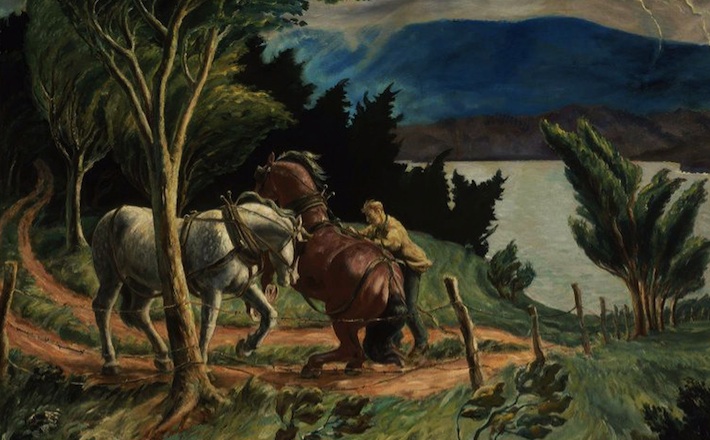Commentary on Job 38:1-7 [34-41]
Finally and dramatically, God responds to Job from a whirlwind.
This is the moment we’ve been waiting for. Will Job get to lay out his case before God? Will God tell Job why all of these terrible things have happened? Will God restore Job’s reputation, vindicating him of any wrongdoing?
Not exactly. The God whom Job meets for this, the very first time is somewhat disappointing. This God doesn’t seem interested in Job’s situation or in providing answers to any of Job’s questions. Instead, this is a God who has questions for Job — nearly four chapters worth of them — and no apparent answers. “Gird up your loins like a man, I will question you, and you shall declare to me,” says this God.
‘Where were you when I laid the foundation of the earth?
Tell me, if you have understanding.
Who determined its measurements — surely you know!
Or who stretched the line upon it?
‘Can you lift up your voice to the clouds,
so that a flood of waters may cover you?
Can you send forth lightnings, so that they may go
and say to you, “Here we are”?
What is immediately striking about the divine speeches (which don’t conclude until the end of chapter 41) is that they are full of powerful images that are focused almost entirely on workings of the universe itself, on things which humans know little about and over which they have no control. When you put these chapters alongside the first creation story in Genesis 1 there is a significant overlap — God is the one calling creation into being and setting it in motion before humans even existed. This is a God who just has to say the word and the forces of nature obey.
How do these chapters, though, with question upon question, serve as an answer to Job? They are clearly not a response to Job on Job’s terms or to his particular concerns. In fact, God’s many questions seem to be a pretty straightforward way of showing, according to biblical scholar Carol Newsom in The Book of Job: A Contest of Moral Imaginations, that “God is God, and Job is not.” But is this the only point that the biblical writer is making about the relationship between God and humanity in this book? Are God’s questions intended to batter Job further, showing him how insignificant he truly is in the scheme of things and that his concerns are irrelevant?
Scholars have long tried to ascertain whether or not God’s speeches in these chapters are as straightforward as they might first appear. Maybe not, Newsom and others suggest. There is likely far more to these divine speeches than meets the eye. If reading from the perspective of the of wisdom literature and traditions in the Bible (and the Ancient Near East more broadly), for example, then God’s response to Job highlights the notion that God is not an automaton, rewarding the righteous and punishing the wicked. Understanding divine/human relationship in this way was fairly in the ancient Israelite context, one which we see especially in the Deuteronomic writings. In the Book of Job, both Job and his friends hold this view, although they disagree about how it is functioning for Job. For Job, this system has worked for him — he’s been good and received reward — up until now. Now he wants to know why the system seems to have broken down and why God isn’t doing God’s job. On the other hand, Job’s friends argue that God hasn’t failed but that Job has erred.
What we see in the Book of Job and particularly in the divine speeches in this section is that this (Deuteronomic) understanding is false and that while personal piety and virtuous behavior may be worthwhile in and of themselves, they may not necessarily lead to personal gain or material success. This can certainly be disconcerting to readers — we want the good guy to win (and benefit) in the end. It can also be a relief, though, in that it is a very clear statement that victims — of tragedy, illness, violence, and poverty, among other things — are not necessarily to blame for their misfortunes. Sometimes bad things happen and there is no good reason.
Another lens that might be helpful in understanding the divine speeches is that of creation (which the imagery so strongly implies). Job’s catastrophe leads him to believe that maybe the world is, at its foundation, random and chaotic. Maybe no one really has the reigns and or is at the wheel after all. What is interesting about God’s response to Job is that through the many questions, God points to the deep order and structure in the universe. There is meaning. There is some underlying structure. There is some order.
In a universe created by God and in which humans live, the challenge is how to hold these two aspects together — 1) the world is orderly and 2) tragedy doesn’t always have a reason. In some ways, these two aspects show very different realities that exist simultaneously. The realities of Job and God collide in this section, and they are both true. The fact that God responds with questions, though different than Job’s, also suggests that the dialogue between them is ongoing, open and unfinished. This might be the best news of all. Job is not God but they are somehow connected to each other.


October 18, 2015